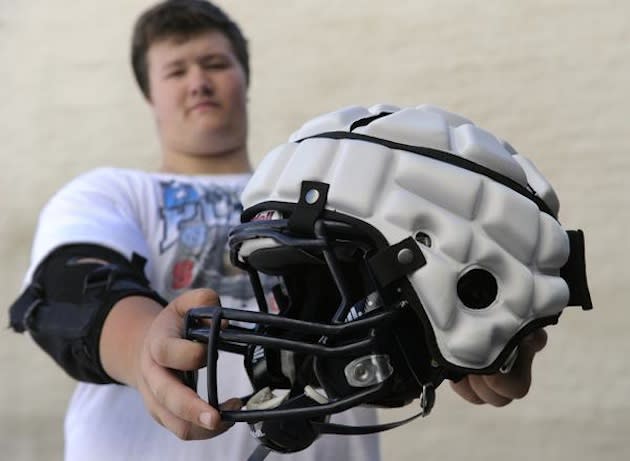Colorado authorities are actively banning a product that decreases concussion risk. This makes no sense
Football is a dangerous game with serious health risks at all levels. That’s still true in high school competition across the country, even with the microscope training in on long term mental health risks and the threat of concussions that come each time a player takes the field.
Yet, in 2012, a product emerged that could potentially greatly diminish that risk. Guardian Caps, gel-based helmet toppers produced by a company called Protect Our Children, showed a dramatically decreased threat of concussions when the caps were used in practice. Initial anecdotal evidence was backed up by steady use from schools like California power Orange (Cal.) Lutheran High, which used a full 100 Guardian Caps in practices during the 2012 campaign and tracked a significantly decreased number of head injuries.
On the back of that success, schools across different areas of the country have jumped on board, trying to get in on the Guardian Caps success story. There’s just one problem: The helmet manufacturers don’t want them to become legal during game action, and they’ve now got the National Operating Committee on Standards for Athletic Equipment (NOCSAE) to agree with them.
That’s how a Colorado school now finds itself with $1,000 worth of Guardian Caps that it simply can’t use. The Colorado State High School Activities Association (CHSAA) released a memorandum stating that it agreed with the ruling of the NOCSAE, and would not allow schools to use Guardian Caps during any games in the 2012 season.
What, pray tell, is the reason for NOCSAE rejecting Guardian Caps from being used on the field of play? According to the Coloradoan, it simply hasn’t had a chance to test them yet. In fact, it feels that they should be tested with new certification guidelines as a separate product.
In other words, the NOCSAE is trying to protect its own turf. This is an abomination.
As noted by the Denver Post, Guardian Caps have been shown to reduce the impact of head collisions by 33 percent. Those benefits were more than sufficient to encourage the National Federation of State High School Associations to sanction Guardian Caps as legal additions to helmets for practices and games. Yet that’s not good enough for the NOCSAE or the CHSAA, which has said that schools who use Guardian Caps in practice would not be supported by traditional liability insurance that the state helps broker for schools.
Naturally, there are still a number of kinks to be worked out to make Guardian Caps more effective. One Colorado coach noted that the caps’ snaps often break, making them less durable than needed to last a long, tough season. The $55 cost of each cap is also significant for larger programs that want to outfit their entire squads.
Still, with 8,000 Guardian Caps used across the country in 2012, the device has momentum. And with significantly fewer concussions reported from those schools using the caps, there is reason to believe that they’re helping.
That, apparently, isn’t enough for Colorado or the NOCSAE, for it’s own reasons. It isn’t the first time that the sanctioning authority for sports equipment has had its motivations brought under closer inspection, and it probably won’t be the last, either.
Want more on the best stories in high school sports? Visit RivalsHigh or connect with Prep Rally on Facebook and follow us on Twitter.

 Yahoo Sports
Yahoo Sports 

